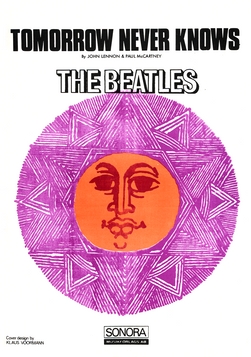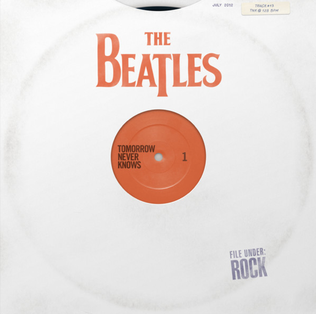
The Beatles were an English rock band formed in Liverpool in 1960. With members John Lennon, Paul McCartney, George Harrison and Ringo Starr, they became regarded as the foremost and most influential music band in history. Rooted in skiffle, beat and 1950s rock and roll, the group were integral to pop music's evolution into an art form and to the development of the counterculture of the 1960s. They often incorporated classical elements, older pop forms and unconventional recording techniques in innovative ways, and later experimented with several musical styles ranging from pop ballads and Indian music to psychedelia and hard rock. As the members continued to draw influences from a variety of cultural sources, their musical and lyrical sophistication grew, and they were seen as an embodiment of the era's sociocultural movements.

Revolver is the seventh studio album by the English rock band the Beatles. Released on 5 August 1966, it was the Beatles' final recording project before their retirement as live performers and marked the group's most overt use of studio technology up to that time, building on the advances of their late 1965 release Rubber Soul. The album's diverse sounds include tape loops and backwards recordings on the psychedelic "Tomorrow Never Knows", a classical string octet on "Eleanor Rigby", and Indian-music backing on "Love You To". The album was reduced to eleven songs by Capitol Records in North America, where three of its tracks instead appeared on the June 1966 release Yesterday and Today.

Geoffrey E. Emerick was an English sound engineer who worked with the Beatles on their albums Revolver (1966), Sgt. Pepper's Lonely Hearts Club Band (1967) and Abbey Road (1969). Beatles producer George Martin credited him with bringing "a new kind of mind to the recordings, always suggesting sonic ideas, different kinds of reverb, what we could do with the voices".

"Within You Without You" is a song written by George Harrison and released on the Beatles' 1967 album Sgt. Pepper's Lonely Hearts Club Band. It was Harrison's second composition in the Indian classical style, after "Love You To", and was inspired by his stay in India in late 1966 with his mentor and sitar teacher, Ravi Shankar. Recorded in London without the other Beatles, the song features Indian instrumentation such as sitar, dilruba and tabla, and was performed by Harrison and members of the Asian Music Circle. The recording marked a significant departure from the Beatles' previous work; musically, it evokes the Indian devotional tradition, while the overtly spiritual quality of the lyrics reflects Harrison's absorption in Hindu philosophy and the teachings of the Vedas.

"Yer Blues" is a song by the English rock band the Beatles, from their titular 1968 album The Beatles, also known as "The White Album". Though credited to Lennon–McCartney, the song was written and composed by John Lennon during the Beatles' retreat in Rishikesh, India.

Choose Love is the 14th studio album by Ringo Starr, released in 2005.

"Do You Want to Know a Secret" is a song by English rock group the Beatles from their 1963 album Please Please Me, sung by George Harrison. In the United States, it was the first top ten song to feature Harrison as a lead singer, reaching No. 2 on the Billboard chart in 1964 as a single released by Vee-Jay, VJ 587.

Oh My Gawd!!! is The Flaming Lips' second album, released on Restless Records in 1987.
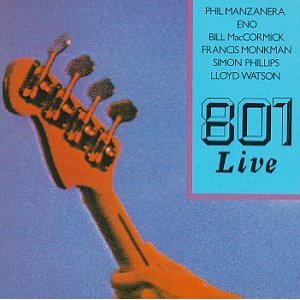
801 Live is the first live album by 801, released in November 1976. In 1976, while Roxy Music had temporarily disbanded, 801 got together as a temporary project and began rehearsing at Island Studios, Hammersmith, about three weeks before their first concert.
"Boys" is a song by Luther Dixon and Wes Farrell, originally performed by the Shirelles and released as the B-side of their "Will You Love Me Tomorrow" single in November 1960. It was recorded more than two years later by the Beatles and included on their first album released in the United Kingdom, Please Please Me (1963).
Startling Music is a music publishing company, founded by musician Ringo Starr, drummer of the Beatles.

Love is a soundtrack remix album of music recorded by the Beatles, released in November 2006. It features music compiled and remixed as a mashup for the Cirque du Soleil show of the same name. The album was produced by George Martin and his son Giles Martin, who said, "What people will be hearing on the album is a new experience, a way of re-living the whole Beatles musical lifespan in a very condensed period."

The studio practices of the Beatles evolved during the 1960s and, in some cases, influenced the way popular music was recorded. Some of the effects they employed were sampling, artificial double tracking (ADT) and the elaborate use of multitrack recording machines. They also used classical instruments on their recordings and guitar feedback. The group's attitude toward the recording process was summed up by Paul McCartney: "We would say, 'Try it. Just try it for us. If it sounds crappy, OK, we'll lose it. But it might just sound good.' We were always pushing ahead: Louder, further, longer, more, different."
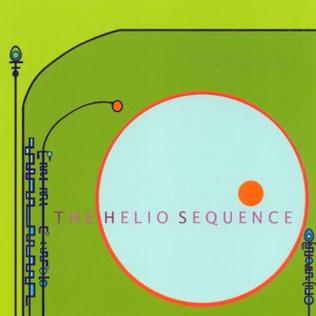
Com Plex is the first full-length album by indie rock band The Helio Sequence. It was released September 5, 2000 on Cavity Search Records. It contains a cover of the Beatles song "Tomorrow Never Knows".

"Eight Days a Week" is a song by the English rock band the Beatles. It was written by Paul McCartney and John Lennon based on McCartney's original idea. The song was released in the United Kingdom in December 1964 on the album Beatles for Sale. In the United States, it was first issued as a single in February 1965 before appearing on the North American release Beatles VI. The song was the band's seventh number 1 single on the Billboard Hot 100, a run of US chart success achieved in just over a year. The single was also number 1 in Canada, Belgium and the Netherlands.
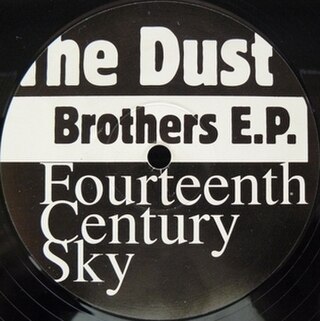
Fourteenth Century Sky is an extended play (EP) by English big beat duo The Chemical Brothers, their second release under the name The Dust Brothers. The EP contains "Chemical Beats" and "One Too Many Mornings", later released on the Brothers' debut album Exit Planet Dust.
There are two different versions of the EP in terms of design, one has a predominantly black background as in the picture, the other is predominantly white and appears to be somewhat rarer.
"Here Today" is a song by Paul McCartney from his 1982 album Tug of War. McCartney wrote the song about his relationship with and love for John Lennon, who had been murdered less than two years before. He stated the song was composed in the form of an imaginary conversation the pair might have had. The song was produced by The Beatles' producer George Martin. Although not released as a single, the song reached #46 on the Billboard Mainstream Rock charts.
